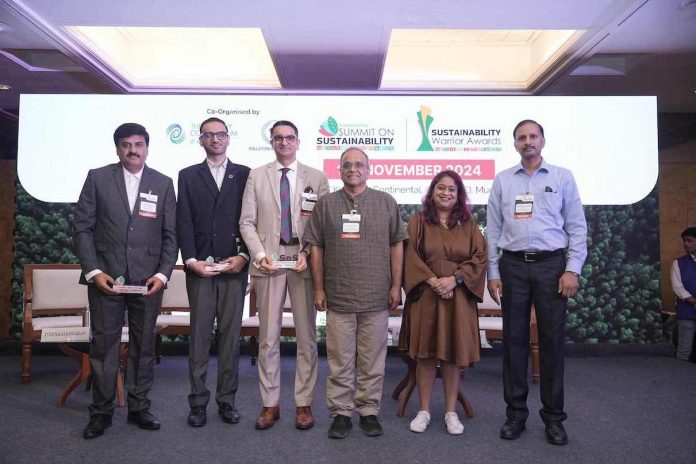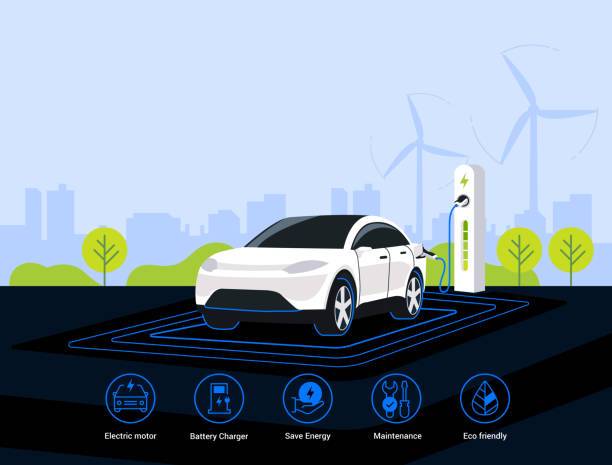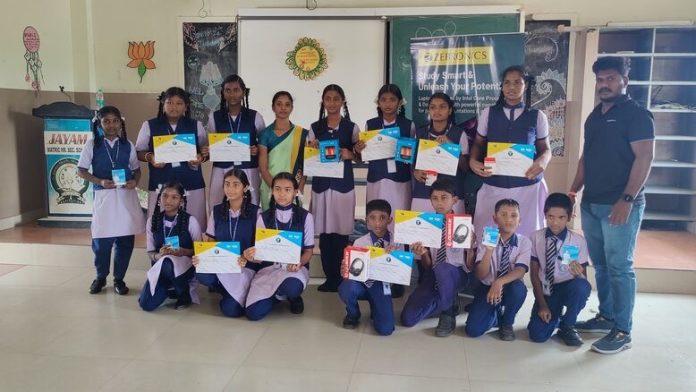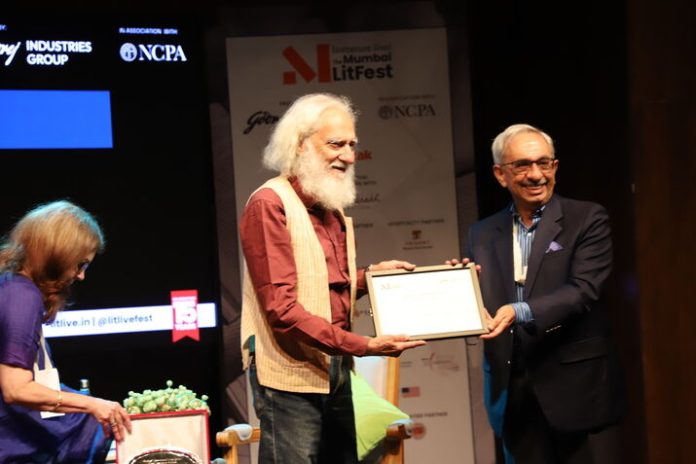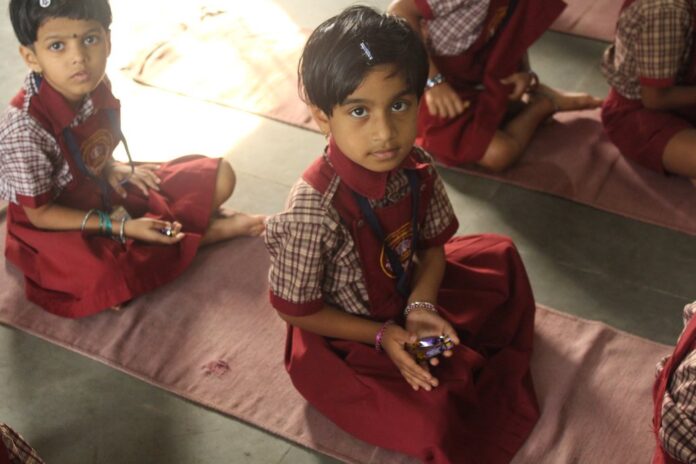Early Warning, Early Action: Reliance Foundation – UN India convening brings experts, ideas together in Odisha
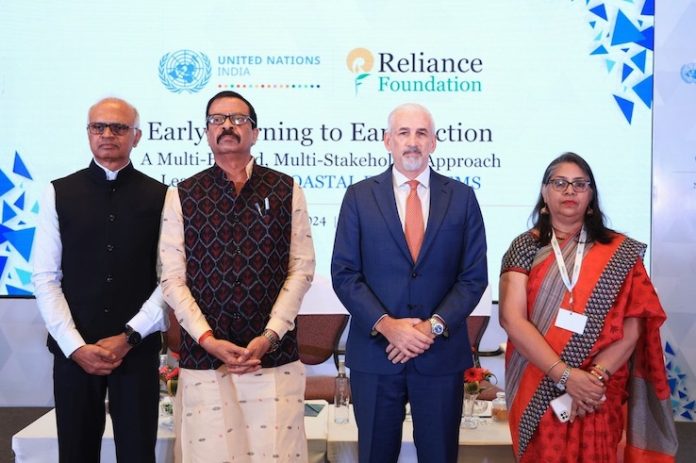
Building new ideas to strengthen early action during disasters, Reliance Foundation and the United Nations India convened stakeholders from the Global South to deliberate multi-hazard, multi-stakeholder approaches to early warning, here today.
The Odisha convening, titled ‘Early Warning to Early Action – A Multi-Hazard, Multi- Stakeholder Approach: Learning from Coastal Ecosystems’, is the first in a series of convenings that Reliance Foundation and the UN India are organising. The gathering highlighted Odisha’s leadership in early warning and early action in a disaster-prone coastal area with focus on livelihoods and gender.
Experts from state and national disaster management agencies including the National Disaster Management Authority, India Meteorological Department and Indian National Centre for Ocean Information Services, UN organisations, researchers, policy experts, academia and non- governmental organisations were part of in-depth discussions.
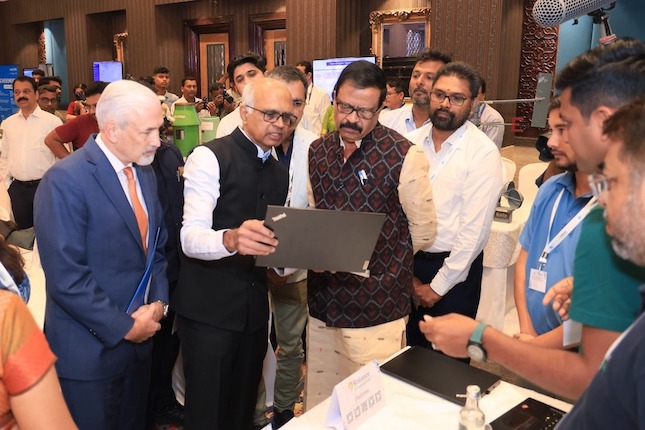
The Chief Guest at the convening, Mr. Suresh Pujari, Minister for Revenue and Disaster Management, Government of Odisha, said, “We are working collectively to further strengthen early warning systems, and we are happy that Odisha has been chosen as the first state to start this series of deliberations. The Odisha government works with various stakeholders on minimising the intensity of natural disasters. We will be working with the UN, Reliance Foundation and all other stakeholders for suggestions and technological assistance. We request the organisations we work with to find ways to integrate disaster prediction with information analysis for greater accuracy in early warnings.”
“As climate change drives more extreme events, there is a need to strengthen impact-based forecasting to ensure it translates more effectively to local action. We have witnessed the lifesaving potential of early warnings while serving communities during cyclones, floods, and other extreme events. India is pioneering knowledge advancement in rapidly advancing early warning systems. We have been driving innovative solutions in early warning systems through extensive use of technology and approaches for effective reach and impact. The convening series, being organised by Reliance Foundation and the United Nations in India office, aims to work collectively with various stakeholders to realise the goal of translating knowledge into local action,” said Mr. Jagannatha Kumar, CEO, Reliance Foundation.
“Answering the UN Secretary-General’s call for Early Warning for All across the world, the convening today organised by the UN in partnership with Reliance Foundation is the first in a series of convenings on DRR. We’re also showcasing the Government of Odisha’s leadership in Early Warning Systems for disaster response, a crucial story to tell and an opportunity to share best practices and knowledge with other states and countries in the Global South. The UN remains committed to supporting these efforts through our various agencies, working closely with the government, civil society, and partners like Reliance Foundation to strengthen Early Warning Systems and build community resilience,” said Mr. Shombi Sharp, UN Resident Coordinator for India.
Experts focussed on the present advancements in early warning systems, sharing varied perspectives on challenges and ways to strengthen early action, including deliberating approaches to future-proof disaster preparedness in the panel discussions ‘Current State of EWS and Early Action: Assessing effectiveness’ and ‘Future Proofing and Innovation towards Integrated Early Warning System’. The sessions also underscored the need for multi-hazard approaches and integration of socio-demographic information with meteorological data for targeted early action messaging.
Through discussions focussed on learnings from recent implementation of early warning systems in coastal states, youth and child-led disaster risk reduction initiatives and integration of livelihood protection along with early warning systems.
The convening facilitated South-South knowledge exchange with experts from Sri Lanka and Bangladesh sharing their best practices and highlighting the importance of strengthening collaborations. The panellists also reflected on pre-convening field visits to villages in Balasore and Bhadrak districts to see the work of Reliance Foundation and the UN India, in collaboration with the administration. A curated walk at the convening helped delegates experience innovations and further enhanced the knowledge exchange process on the country’s efforts to strengthen early warning and action.
The Early Warning to Early Action convening series aims to document best practices, identify innovations, and deliver impactful policy-level outcomes to save more lives and livelihoods.
Disclaimer: This media release is auto-generated. The CSR Journal is not responsible for the content.
CSR News: Reaching out to 10,000 students across Tamil Nadu through Zeb-Tech CSR initiative
As part of Zebronics’ ongoing Doctrine of Care philosophy, Zeb Tech continues to foster inquisitive thinking and inspire young minds across India. Through an array of competitions and interactive sessions, Zeb Tech promotes curiosity and engagement with a variety of subjects and arts, designed to ignite passion and enhance knowledge among students. In the last 2 quarters of this year alone the initiative has reached over100+ schools nationwide; covering 60+ schools in Tamil Nadu and Chennai positively impacting over 10,000 students in Tamil Nadu and over 15,000 students PAN India.
Through an array of competitions, Zeb Tech promotes inquisitive thinking among school students, igniting interest in a variety of subjects and the arts. Activities are carefully segmented by age group, that are tailored to students’ unique learning needs and enabling them to develop skills in teamwork, problem-solving, and creative thinking. A recent highlight of the program was a series of quiz competitions, where students demonstrated impressive knowledge and collaborative spirit, making the event a memorable and rewarding experience.
Speaking on the initiative, Mr. Rajesh Doshi, Co-Founder & Director of Zebronics, said, “Zeb Tech is more than just a CSR initiative for us. At Zebronics, we believe learning should be engaging and enjoyable, which drives our efforts through Zeb Tech. By connecting directly with students through interactive activities like quizzes, arts & crafts, and more, we aim to spark curiosity and foster essential skills.
Our goal is to make knowledge accessible in a way that resonates with young minds, inspiring them to develop a lifelong love for learning and stay ‘Always Ahead’.”
Disclaimer: This media release is auto-generated. The CSR Journal is not responsible for the content.
CSR News: Jane Goodall Institute’s India Youth Council Programme Launched
Godrej Industries Group has announced the launch of Jane Goodall Institute (JGI) India’s Youth Council Programme.
Launched in presence of Burjis Godrej, Executive Director, Godrej Agrovet Limited and Dr. Jane Goodall, renowned primatologist & anthropologist. Council members from across India will run their own self-directed initiatives and provide input across program initiation and related communications through the Roots & Shoots program. Roots & Shoots, a program of the JGI, is a global movement that aims to bring together the youth from all walks of life for one goal – the betterment of our environment.
Commenting on the launch, Burjis Godrej who will serve as a mentor for the initiative said, “We are excited to inaugurate, the JGI’s India Youth Advisory Council. Rooted in empathy and kindness, this council stands for every act of goodness, whether it’s protecting our environment, advancing animal welfare, or supporting any cause that makes a positive difference.”
“As ambassadors of JGI India, these young leaders will design and launch community-centered projects, advocate for worthy causes, and inspire others through their compassion and action. Supported by mentors and experts, they will grow into empathetic leaders, ready to make a difference wherever it’s needed. Today, we celebrate the beginning of their journey, and we look forward to seeing the kindness and impact they will bring into the world”, he further added.
Addressing the gathering Dr. Jane Goodall, Founder of JGI, shared that despite the consistent degradation of our planet, we saw hope in four things – the ability of nature to revive itself, the power of the human brain, the indomitable human spirit and above all, the power of youth.
She said, “It’s young people who truly give me hope. When these individuals understand what’s wrong and choose to make a difference, change will be initiated . While they can’t make everything right. Even if they chose one goal which they care about and try to get their friends together and work on it, there will be a visible positive impact.”
Dr. Jane Goodall also facilitated Roots & Shoots mentors Valerie Mascarenhas, Principal Don Bosco School, Mumbai and Vandana Pandey, Principal, Yash Vidya Mandir, Ayodhya who had created exemplary youth-led programmes in their schools.
Disclaimer: This media release is auto-generated. The CSR Journal is not responsible for the content.
Kotak Mahindra Bank CSR Report: Empowering Indians through Education
The Kotak Mahindra Bank has been in business for 21 years now. The bank has a wide reach with about 1,869 branches across the country. It also has a presence outside India in Singapore, London, the USA and the Middle East. The Bank has cemented its distinctive status through unique offerings and services, e.g. its industry-leading differentiated interest rate strategy on savings accounts; and India’s first video-based KYC savings account that serves the twin purpose of convenience and contactless opening of an 811 account in a highly digitised post-COVID ‘new normal’.
Kotak Mahindra Bank is conscious of the interdependencies between its economic activities and the ecosystem it operates in. Therefore, it has ensured that Environmental Social Governance (ESG) philosophy goes beyond a set of policies and practices and is an integral element of the culture of the bank.
The Bank’s Corporate Social Responsibility (CSR) Programmes are largely long-term, implemented in focused geographies, are sustainable and scalable, and aligned with the United Nations Sustainable Development Goals (SDGs) and India’s development priorities.
Over the years, the bank has increased its CSR expenditure. In FY 2023-2024, the firm spent Rs. 230.81 crores for its CSR initiatives which was more than the prescribed amount as mandated by law.
1. Kotak Mahindra Bank CSR
Kotak Mahindra Bank believes in positively contributing to the economic, environmental and social well-being of communities through Corporate Social Responsibility (CSR) agenda. The key areas of focus of CSR projects of Kotak Mahindra Bank are education, livelihood, healthcare, environment and sustainable development and sports. The Bank identifies suitable NGOs partners to carry out these programmes. It focuses on implementing programmes that are sustainable, scalable and can be implemented across various locations with measurable and sustainable impacts amongst the community.
2. CSR Policy
Kotak Mahindra Bank has established a Board-level Corporate Social Responsibility Committee which is responsible for monitoring, reviewing and approving CSR initiatives and expenditure. The Committee makes recommendations to the Board on CSR policy and related matters. As per the CSR policy, Kotak Mahindra Bank, at all times, is committed to:
Engage with communities to understand their material expectations and concerns, and will consider these material expectations and concerns to design its CSR agenda.
Implement, monitor, review and evaluate CSR initiatives to achieve the desired outcomes in a transparent manner.
Undertake projects in the areas of promoting education, enhancing vocational skills and livelihood, promoting preventive healthcare and sanitation, reducing inequalities faced by socially and economically backward groups, sustainable development, relief and rehabilitation, and interventions towards a cleaner India under Swachh Bharat Mission with the aim to serve communities at large and to transform their lives.
Partner with government agencies, non-governmental organizations (NGOs) and other institutions to collectively deliver the community development initiatives and support such organizations and institutions with appropriate and necessary resources.
Encourage its employees to contribute and volunteer for various community development initiatives.
Ensure that surplus arising out of CSR initiatives is utilized to further augment the CSR agenda and does not form part of the Bank’s profits.
Comply with all legal provisions applicable for CSR and adopt industry best practices, where feasible.
3. Kotak CSR Initiatives in Education and Livelihood
Kotak Mahindra Bank implements its CSR programmes on Education and Livelihood through Kotak Education Foundation (KEF). The foundation supports children & youth from underprivileged families through different education and livelihood based interventions to help them rise above the poverty line & lead a life of dignity through sustainable processes.
Through the foundation, Kotak works in various sub-areas to conduct many initiatives.
3.1 Improving Learning Outcomes in Schools
Kotak Education Foundation focuses on improving learning outcomes among students through capacity building for teachers, promoting digital education, supporting learning needs of children in schools as well as in their communities, and development of infrastructure.
KEF works across 160+ schools in Maharashtra and Gujarat, in areas such as school leadership, foundational literacy, numeracy, digital learning, teacher training and communicative English. The organisation has collaborated with various implementing partners to enable access to vernacular content in Science to government schools in rural UP. It has also trained next generation education who have initiated the use of Information and Communication Technology (ICT) in teaching. Through the Girl Child Education project, KEF is supporting mainstreaming of 3,000+ girls who dropped out of formal schooling. Apart from these initiatives, KEF has also been supporting early childhood education in Balwadis and through Creches at construction sites.
Project Science Programme
The Khan Academy’s Science Program, supported by Kotak Mahindra Bank, plans to reach about 700 Kasturba Gandhi
Balika Vidyalaya’s (an all-girls residential school for girls from disadvantaged communities) and 1,500+ Madhyamik schools in the state of Uttar Pradesh.
The CSR project leverages NCERT aligned core science content offering for Grades 9-12 which was created with support of the Bank and customised in accordance with UPSCERT. During the project period, KAI Science Program was rolled out in 698 school, reaching over 59,000 students. KAI trained more than 750 teachers, 70 District Coordinators, and more than 100 science mentor teachers. KAI track the progress using the Skills to Proficiency (STP) metric on the Khan Academy platform, recommending 30 minutes of use per week. The project operates at the unique intersection of technology, gender and capacity building of public school systems.
3.2 Supporting Higher Education
Kotak Education Foundation has supported about 3300 students through scholarship programmes. The organisation’s Kotak Shiksha Nidhi initiative provides financial aid to students that have lost a primary earning member of their family to COVID-19. Kotak Kanya is another program which supports the career aspirations of meritorious girls from underprivileged financial backgrounds.
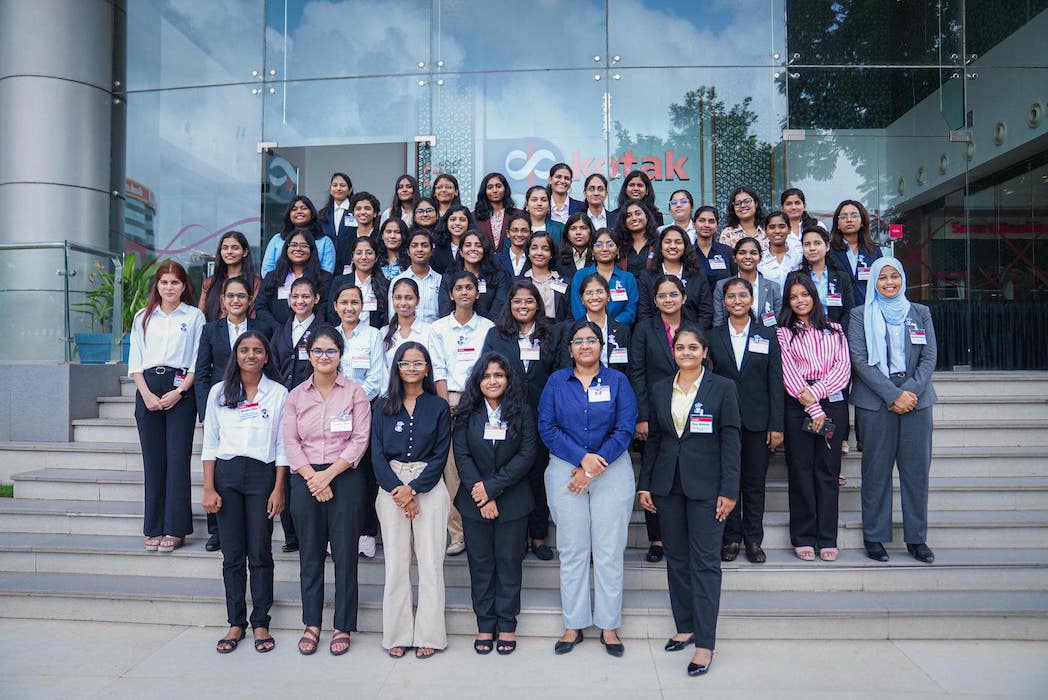
In addition, KEF has been supporting higher education and research that cater to the short term and long term needs of India. For example, KEF has been supporting Indian Institute of Science (IISc) to establish a Centre for Artificial Intelligence and Machine Learning (AI-ML Centre) in Bengaluru since FY 2021-22.
Furthermore, Kotak Education Foundation has extended its support to IIT Kanpur to launch Kotak School of Sustainability, a one-of-a-kind, inter-disciplinary school with an aim to propel sustainability education. It is India’s first integrated School of sustainability with a vision to promote pedigree education, research and outreach. This school is poised to offer thought leadership solutions towards sustainability actions and prepare future generations to take lead on sustainable development. The school brings together departments and centres of excellence at IIT Kanpur with an aim to provide an enabling environment for collaborative research across multiple facets of sustainability such as clean energy, environment, ecology, circular economy, climate finance, sustainable societies and policy.
3.3 Skill Development
Kotak Mahindra Bank supports multiple organisations to provide sector specific skill development to youths to enhance their employability. In FY 2023-24, over 13,200 youths were trained, of which 60% were either successfully placed with different organisations or became entrepreneurs.
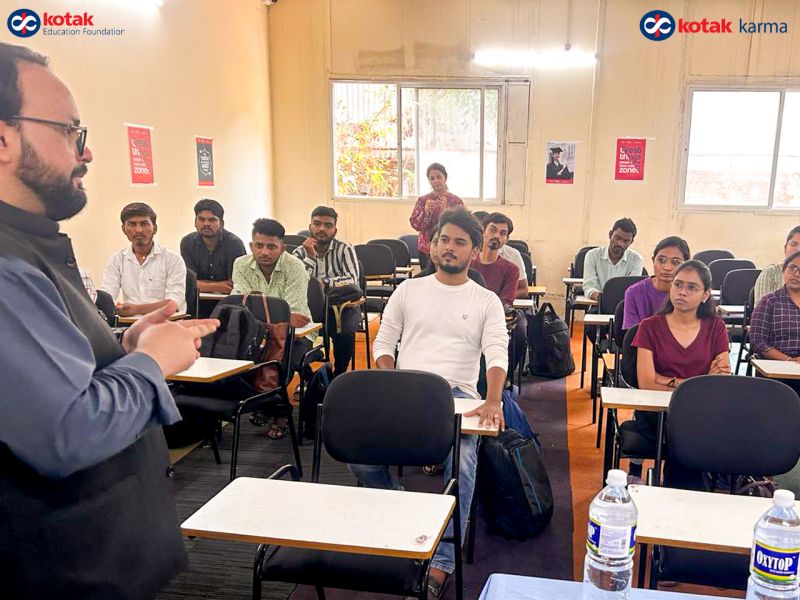
The organisation also worked with multiple agencies to provide sector specific skill training to over 2,000 Persons with Disabilities (PwD). In FY2023- 24, nearly 1500 people were placed in different organisations, making them financially independent.
3.4 Entrepreneurship
Kotak Mahindra Bank has actively promoted entrepreneurship amongst women (including those from tier-2 and tier-3 Indian cities) through Women’s Startup Programme that is managed by IIM Bangalore. Around 269 ventures led by women were nurtured through mentoring and advisory support under this initiative.
3.5 Promoting Rural Livelihoods
Kotak is implementing various initiatives focused on agriculture, livestock and Non-Timber Forest Product, aiming to improve income for farmers. Through multiple organisations, the Bank has benefitted over 12,500 farmers in FY2023-24.
4. Kotak CSR Initiatives for Healthcare
Kotak Mahindra Bank has three sub-areas that comprise its CSR initiatives in healthcare. They are: addressing gaps in the cancer care spectrum, improving access to healthcare and improving infrastructure for healthcare.
4.1 Addressing gaps in cancer care
Kotak’s interventions in cancer care span across earlier detection, treatment support (including accommodation and nutrition) and hospice care. Through various collaborations, Kotak Mahindra Bank was able to aid more than 5,900 cancer patients in FY 2023–24, of which 4,100 were paediatric patients.
View this post on Instagram
4.2 Improving access to healthcare
Kotak Mahindra Bank works to provide access to affordable healthcare facilities to rural communities and low-income households through mobile medical vans, eye check-up camps and oral cancer screening camps under its CSR interventions. The organisation was able to reach 3.3 lakh beneficiaries for primary healthcare and 1.2+ lakh through eye care camps, surgery and treatment that included school students and senior citizens.
The Bank has also conducted Oral Cancer Screening camps at six markets under the Agricultural Produce Market Committee and also for police personnel in Mumbai. Through various initiatives, it has also provided early interventions, rehabilitation and mobility solutions for PwDs and supported treatment of over 6,700 children with clubfoot in 45 districts of Uttar Pradesh.
5. Environment and Sustainable Development
Kotak Mahindra Bank uses ecosystem restoration approach to support initiatives that replenish water, reduce carbon and benefit communities.
5.1 Enhancing Water Security
In rural areas, the Bank has worked with around 9,000 farmers and their communities in water-stressed regions across India. The main purpose of these interventions is to build water security and improve crop production through soil and water conservation measures and de-siltation of traditional water reservoirs. About ~6,000 Ha of land has been positively impacted under this program and a water harvesting capacity of 340 crore litres has been created. These measures along with the income diversification efforts is expected to improve the incomes of these farmers approximately 30 per cent.
In urban areas, waterbodies are often at risk of encroachment, illegal waste dumping and degradation. To address some of these risks, Kotak Mahindra Bank is rejuvenating 5 lakes and a 0.8 km stretch of a creek by clearing garbage and weeds. This restoration is across a total area of ~370 acres and is expected to act as a microhabitat for biodiversity and a recreational space for community to connect with nature.
6. Sports
Kotak Mahindra Bank has partnered with Pullela Gopichand Badminton Foundation to develop a world-class badminton training facility in Hyderabad. In FY 2023-24, the Bank supported 30 Athletes with training, nutrition, sports science and other mental and physical wellbeing related services through this collaboration.
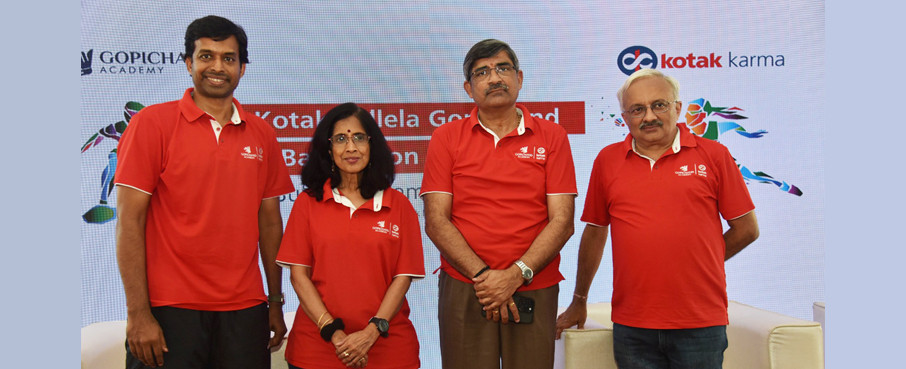
Additionally, Kotak Mahindra Bank partnered with the Inspire Institute of Sport, to implement a Boxing training programme. 100+ junior and elite boxers were supported under the programme who won 90 medals across domestic and international competitions.
Conclusion
Kotak Mahindra Bank follows a practical, effective and scalable approach with utmost transparency in both – its business operations as well as CSR initiatives. Kotak Mahindra Bank’s CSR is highly aligned with the UN SDGs, which helps in the holistic development of the Indian Society.
Animal cruelty: Two booked for abusing Indian Python following PETA India’s intervention in Noida
Gautam Buddha Nagar, India: Acting on a video depicting the abuse of an Indian Python for entertainment, a species protected under Schedule I of the Wild Life (Protection) Act (WPA), 1972, People for the Ethical Treatment of Animals (PETA) India collaborated with the Gautam Buddh Nagar Forest Division for a preliminary offence report (POR) to be registered. The python has now been rescued and safely released back into the wild.
The incident occurred during an event in ATS HomeKraft Happy Trails Society, Sector 10, Greater Noida – 201 318 on 6 October. During it, the python’s head was forced between the teeth of an accused’s mouth, clamping the snake’s jaw between his teeth. The POR was registered against two individuals under sections 9, 39, 48, 49 and 51 of the WPA, 1972. The offence is non-bailable and punishable with a jail term of at least three years, which may extend to seven years, and a fine of at least ₹25,000.
“We commend Shri Ramesh Chandra, IFS, Conservator of Forest, Meerut Circle, and Shri Pramod Kumar Srivastava, IFS, Divisional Forest Officer, Gautam Buddha Nagar Division, for registering the POR and sending a clear message that cruelty to animals will not be tolerated,” says Virendra Singh, Cruelty Response Coordinator at PETA India. “The best way to revere snakes is to leave them alone in their jungle homes. Using snakes in roadside shows is cruel, illegal, and disrespectful.”
Snakes are trapped and taken from their natural habitats to be used for entertainment and kept as “pets,” disregarding the WPA, 1972. Their teeth are often violently yanked out and their venom glands emptied for species who are venomous. In many cases, their mouths are sewn shut, leaving only a tiny gap into which liquid can be poured. Captured snakes do not live very long, and their death is slow and painful.
Disclaimer: This media release is auto-generated. The CSR Journal is not responsible for the content.
CSR News: Power company hosts Urja Mela in Odisha, involving students from over 500 schools to promote energy conservation and sustainability
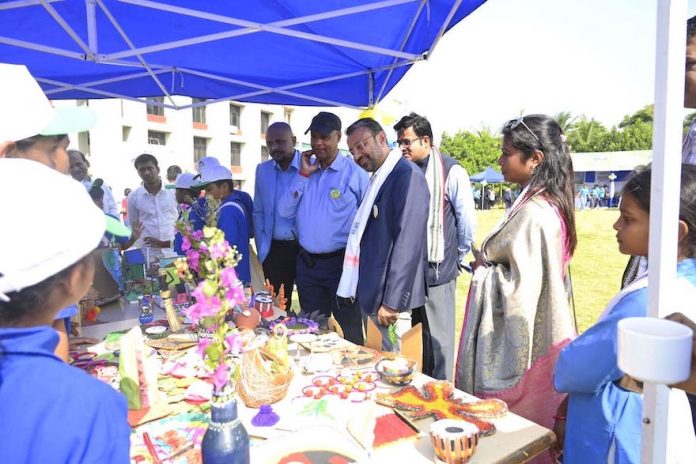
In a testament to its commitment to promoting energy conservation and adoption of clean energy, Tata Power hosted the first-ever State-Level Urja Mela in Bhubaneswar, Odisha, bringing together over 470 students from across Odisha. Serving as a precursor to Tata Power’s national Urja Mela annually conducted during National Energy Conservation Week, this event was part of the company’s Club Enerji initiative, which promotes sustainability through hands-on activities, experiential learning, and inclusive participation.
Over the past three years, Club Enerji’s footprint in Odisha has expanded significantly. Through Tata Power’s four Discoms — TPCODL, TPWODL, TPNODL, and TPSODL — the initiative has engaged more than 500 schools across the state, including key regions like Bhubaneshwar, Sambalpur, Behrampur, Baleswar, creating a vibrant community of young energy conservation advocates. The students who participated in the state-level event were nominated after series of regional mini-Urja melas.
The Odisha Urja Mela featured various competitions, including a Science Exhibition, Best Out of Waste models, Painting, Quiz, and an essay competition, encouraging students to embrace environmental stewardship, resourcefulness, and innovation in energy conservation. In a strong show of inclusivity, special competitions were also held for visually impaired and deaf students, in alignment to Tata Power’s Pay Autention initiative, which focuses on empowering the neurodiverse community.
The event was attended by Tata Power’s senior leaders including Mr. Himal Tewari, Chief Human Resources Officer and Chief of Sustainability and CSR at Tata Power, along with Padma Shri recipient Sabarmatee Tiki and representatives from UNICEF, UNDP, Tata Steel, IHCL, TCS, and Tata Strive. The event also saw attendance from Corporates and NGOs like Aditya Birla Group, LTI Mindtree, JSL, World Food Program and Lighthouse Foundation. The participation of Corporates and UN agencies highlighted the collaborative approach of Club Enerji, reinforcing shared values and a united effort to uplift communities across Odisha.
Reflecting on the event, Mr. Himal Tewari stated, “Sustainability is at the core of Tata Power’s mission. Through Urja Mela, we are empowering young minds to lead a greener, more inclusive future. Odisha has shown remarkable momentum and a positive response to our Club Enerji initiative, with schools actively championing sustainability. We invite more schools and organizations to join us in transforming conservation into a mass movement. By inspiring students to think creatively and innovatively about combating climate change and protecting our planet, we reinforce the essence of our Club Enerji initiative.”
During the event, Tata Power also launched the Club Enerji Conservation Booklet in Odia, building on the success of earlier editions in Hindi and English. This booklet provides students with practical tools for energy conservation and environmental protection. Making it accessible in Odia enables young champions across the state to fully engage with the mission, empowering them as agents of change within their communities.
A special feature of the event was Tata Power’s Gaja Sanrakshana initiative, which raises awareness about biodiversity and habitat conservation by protecting the native Asian elephant in Odisha. This initiative highlights the importance of environmental conservation and inspires the young audience to value the natural ecosystems.
As a cornerstone of Tata Power’s Club Enerji program, which has engaged over 1200 schools across 15 states in India since 2007, the Urja Mela in Odisha underscores the company’s ongoing mission to nurture responsible, environmentally conscious citizens. Through engaging educational modules and practical activities, Club Enerji has raised awareness among nearly five lakh students nationwide, encouraging them to lead positive change within their communities.
Disclaimer: This media release is auto-generated. The CSR Journal is not responsible for the content.
CSR News: Launch of USD 5-Million “Climate x Health: Lighthouse for Asia” Fund to Develop Climate Solutions that Safeguard Community Health

AVPN, the largest network of social investors in Asia, launched the “Climate x Health: Lighthouse for Asia” Fund, supported by the Bayer Foundation. Announced at the Singapore Pavilion session at COP29 in Baku, Azerbaijan, the USD 5-million Fund aims to empower non-profit organisations leveraging climate innovations to create scalable solutions that protect the health of vulnerable communities from the impacts of climate change.
The inaugural Fund will provide selected organisations with up to USD 200,000 to address the severe impacts of climate change on health, especially on vulnerable communities in the region. AVPN will pool philanthropic capital and deploy it through grants and non-grant instruments suited to develop, scale, and co-invest in smart climate solutions, in areas such as food security solutions, infectious disease management, water and sanitation services, and climate-health intelligence systems. These focus areas were chosen for their immense impact on vulnerable communities and the potential for tech solutions to mitigate them. For example, AVPN believes that food security solutions ensure access to nutritious food during climate disruptions, while climate-health intelligence, such as monitoring and early-warning systems, helps anticipate and reduce health risks from extreme weather events that disproportionately affect vulnerable communities. All applicants, including non-grantees, will also receive capacity-building support, such as actionable guidance and networking opportunities within AVPN’s ecosystem of over 600 members which includes climate-health investors, innovators, and policymakers.
Climate adaptation funding is still nascent in Asia, with the Lighthouse Fund being one of the first climate-health focused funds in the region. To ensure funds are used effectively and deliver measurable impacts on climate and health, the “Climate x Health: Lighthouse for Asia” Fund will adopt a data-driven management approach to analyse market needs and social issues, before allocating resources to high-impact organisations. AVPN will also work to conduct impact assessments that incorporate both quantitative and qualitative data, measuring outputs, outcomes, and grantee feedback.
“The climate crisis is a health crisis, disproportionately affecting the most vulnerable. As we convene at COP29, the urgency of the climate crisis in Asia has never been more pressing, with climate events projected to cause two billion disability-adjusted life years by 2050 and Asia bearing 30% of this burden. Something has to change. Innovative solutions are a powerful tool for slowing or even preventing the climate crisis, provided there is adequate investment in the right areas. Social investors are indispensable for driving change in under-invested impact areas like climate and health by providing funding and support for innovative, impactful solutions. AVPN is committed to bringing together the right organisations, investors, and policymakers to harvest the potential of climate adaptation solutions for social good,” said Aravindan Srinivasan, Executive Director, Climate Action at AVPN.
“Not only do we aim to foster more than 20 innovations through the first round of the Lighthouse Fund, but also to strengthen the overall ecosystem and community who drive emerging solutions for climate adaptation to health. We hope our philanthropic grants can catalyze additional capital from other public and private sectors.” said Peng Zhong, Director, Social Innovation at Bayer Foundation.
The Asia Pacific region is warming faster than the global average, with many countries recording their hottest year in 2023, putting its people at risk of heat stress and impacting their ability to work. Climate change is intensifying the frequency and severity of extreme conditions, from droughts to floods. These weather events not only displace vulnerable populations but also threaten future food and water security and endanger livelihoods and infrastructure across the region. As the world’s most disaster-hit area, Asia faces significant risks.
Additionally, climate change is driving new health challenges, including a rise in vector-borne diseases like dengue and Zika in Asia. These temperature shifts expand the geographic range and lengthen transmission seasons of these diseases, increasing health risks year-round and placing additional strain on healthcare systems, especially in vulnerable communities with limited healthcare resources and delayed access to treatment. Without successful action on climate change, the region’s gross domestic product could decline by over 25% in the next 25 years, further compounding the challenges faced by its population.
Funding applications for the Climate x Health: Lighthouse for Asia will open in early.
Disclaimer: This media release is auto-generated. The CSR Journal is not responsible for the content.
From Noctourism to Multigen Megatrips to Boyz II Zen and Vintage Voyaging, here are a few travel predictions for 2025

Gurugram, India: INDIA, November 19, 2024: Change is accelerating on multiple fronts. From global elections, rapid AI advancements and increased costs of living (to name a few), it’s no surprise that people find themselves fatigued, needing to withdraw, pick a side or simply disconnect. Yet, in the face of rising uncertainty, isolation and polarisation, we’re seeing just the opposite in travel. Booking.com’s annual Travel Predictions research* reveals that instead of retreating, many travellers want to redefine how they experience and engage with the world around them.
Travellers are ‘rewriting their playbook’ in 2025; Defying the rules of conventional getaways and as a result, forging new connections with themselves, their loved ones, those they meet along the way, as well as the destinations they visit. Whether rewriting the norms of age, gender or simply what society thinks what a typical vacation should look like, emboldened travellers are breaking out of familiar patterns and using their individual journeys to fuel and find long-lasting personal growth.
To understand how people plan to break away from the status quo, Booking.com commissioned research among more than 27,000 travellers across 33 countries including India to present nine travel predictions which foresee 2025 being the year that ushers in new ways of experiencing the world. From millennials rethinking the airport experience to baby boomers taking on thrill-seeking adventures, travel is becoming more about self-discovery and deep connections.
The trends set to shape the travel industry in 2025:
Trend 1: Noctourism
2025 is the year of stargazing our way into new astro-adventures. The trend of ‘Noctourism’ (nocturnal tourism) refers to travelling to experience the night in all its glory. With space tourism edging ever closer to reality, travellers will be focused on building connections with the universe as they turn to more attainable astro-pursuits next year.
Ditching the daylight crowds for midnight magic, 78% of Indian travellers are interested in visiting dark sky destinations for stargazing and constellation tracking.
76% are willing to travel for once-in-a-lifetime celestial events.
69% prefer vacationing in cooler locations due to climate change concerns.
79% plan activities during cooler hours and 73% aim to reduce sun exposure.
An appreciation for the nocturnal world is also deepening travellers’ connections with nature with 72% seeking accommodations with minimal light pollution to preserve nature.
Trend 2: Passport to Immortality
As travellers search for the elixir of life, a vacation is no longer just time to unwind. In 2025, wellness will go beyond yoga mats and smoothies. Driven by the desire to cultivate better lifestyle choices, 83% of Indian travellers are interested in longevity retreats for deep revitalisation – a super-charged flex on traditional wellbeing itineraries where temporary fixes are replaced in pursuit of a longer, healthier life.
79% are willing to pay for vacations focused on extending lifespan and well-being.
Deep revitalisation is top priority from body vibration therapy (78%), cryotherapy (70%), red light therapy (66%) and stem cell treatment (64%).
85% are looking for new wellness activities they can mix into their daily lives as they reconnect with a more balanced version themselves like timed coffee ingestion (56%) and IV therapy (50%).
Trend 3: AI = Alternative Itineraries
New technologies are already helping travellers find experiences tailored to their needs, but in 2025 we’ll see people using powerful AI tools (such as Booking.com’s AI Trip Planner) to craft alternative itineraries based on personal preferences and the needs of the destinations they hope to visit. These itineraries will encourage deeper connections with local communities and the planet more broadly.
90% of Indians will use technology to make informed decisions and find authentic experiences, to not only respect the locations they visit but contribute positively to them.
83% seek technology to find less crowded areas and 40% use apps for real-time assistance.
57% of Gen Z and 56% of Millennials would reconsider visiting over-touristed destinations.
19% will avoid tagging locations on social media to protect lesser-known destinations.
Trend 4: Multigen Megatrips
The next generation might want to start saving for their own trips. The trend of spending kid’s inheritance (SKI) is set to continue in 2025 as nearly half of Indian travellers (46%) would rather spend their money on a bucket-list trip than leaving an inheritance to their children. This trend is particularly strong in baby boomers at 37%.
84% of Indians believe in the value of intergenerational travel.
Boomers are willing to fund trips for their children and grandchildren (79% and 59%, respectively). Shared experiences are prioritised over material possessions.
Trend 5: Boyz II Zen
Gender norms and expectations are becoming increasingly fluid and this shift is set to extend into the travel industry as well. With growing societal awareness around male mental health, men-only retreats focusing on wellbeing and personal growth will become more prevalent in 2025.
A majority (79%) of Indians confirm they would encourage one of the men in their life to go on a men-only trip.
Men seek travel to improve personal growth (41%), reduce stress (35%), rest and rejuvenate (34%) and prioritise mental health benefits (39% ).
43% are looking to make new friendships and 38% looking to improve their relationship building skills with friends and family, followed by 31% considering a men-only trip to tackle feelings of loneliness.
Women are persuading the men in their lives to go on a men-only trip, with 69% encouraging their partner, 37% their friends, 30% their brother and 22% their father to put themselves first.
Trend 6: Ageless Adventures
If you think the thrills and spills of travel are reserved only for the younger generations, it’s time to think again – adventure has no age limit! In 2025, baby boomers (those born between 1946 and 1964) are redefining what it means to travel later in life.
Baby Boomers are redefining adventure travel, with 30% interested in high-octane activities (up from 11% in 2024**) like sand surfing (42%), skydiving (34%), cave diving (36%), camping in Antarctica (22%) or even volcano boarding (22%).
One out of four Boomers seek to push their comfort zones and reconnect with their adventurous spirit.
Trend 7: Neuroinclusive Navigation
Travellers with neurodivergent needs are calling for a more inclusive approach to travel, and 2025 is set to see significant progress in this area.
76% of Indians believe travel options are limited for neurodivergent individuals.
70% of neurodivergent travellers have had negative travel experiences.
79% seek AI tools for personalised travel information and recommendations.
77% desire sensory rooms in airports and hotels.
75% prefer noise-cancelling options for a calmer travel experience.
78% want industry-wide initiatives to cater to neurodivergent needs.
Trend 8: Vintage Voyaging
Sustainability and careful budgeting are key focuses for 2025 and one trend reflecting this is “vintage voyaging.” Vacation wardrobes will get a makeover in 2025, as trendy Indians turn vintage voyagers, hitting thrift stores while on holiday to curate a more sustainable suitcase. So, why pack new when you can thrift your way?
68% of Indian travellers are interested in vacation shopping during their trips than before.
78% are tightening budgets to maximise travel experiences.
62% intending to be thriftier on their trips, finding bargain hidden gems in second-hand stores.
46% find better quality and value in vintage products abroad than at home.
42% buy vintage items during their travels because they find better bargains.
Trend 9: The Gate Escape
Gone are the days of arriving ‘just in time’ to avoid lingering in crowded lounges post-security, as Indian globetrotters reframe their 2025 vacation kick-off to embrace a new era of airport entertainment. This will be the year the airport takes its place in the limelight as travellers actively seek out destinations with the best airports.
84% of Indian travellers are interested in airports with unique experiences and facilities. 63% would choose destinations based on airport amenities.
Millennials and Gen Z are particularly interested in airport features like sleep pods (38% Millennials, 34% Gen Z), spas (39% both Millennials and Gen Z) and Michelin-star restaurants (27% Millennials, 23% Gen Z).
83% believe a wider array of airport facilities would reduce travel stress and the vacation would start long before boarding the plane.
Santosh Kumar, Country Manager for India, Sri Lanka, Maldives and Indonesia at Booking.com said: “Travel in 2025 marks just the beginning of a more thoughtful, intentional approach to exploring the world. Travellers are no longer satisfied with traditional, cookie-cutter experiences. Instead, they’re seeking trips that defy conventions and align with their personal values – whether that’s sustainability, wellness or cultural immersion. Looking ahead, we can expect technology to further revolutionise how we plan and experience travel. The demand for responsible, regenerative travel will likely rise, pushing both travellers and the industry to rethink how we engage with the world around us. The future of travel is about forging deeper connections—personal, cultural and environmental — and they will continue to shape the way travellers explore in the years to come.”
Disclaimer: This media release is auto-generated. The CSR Journal is not responsible for the content.
CSR News: Energy Consortium, IIT Madras and Pollution Control India collaborate with Impact Leaders on a Summit for Sustainability
